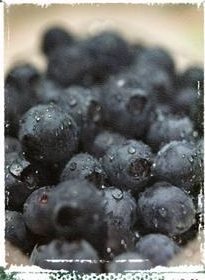- Home
- Better Memory
- Free Memory Tips
- July 2014 Issue
Free Memory Tips, July 2014 Issue
Below is the July 2014 issue of Free Memory Tips. To learn more about this free email newsletter, or to start receiving it, please visit the Subscription Page. I send out the newsletter about once a month. You can unsubscribe at any time.

Welcome to the JULY 2014 issue of my free Memory Tips email newsletter. Below are powerful strategies for improving your memory. Ready to boost your brain power?
Below are powerful strategies for improving your memory. Plus I've included links to free online brain games that can strengthen your thinking skills.
In this issue:
To Recall, Think AROUND It
Blueberries Support Memory
10 Warning Signs of Alzheimer's
"Chunk" to Remember Long Numbers
Featured Free Brain Games
If you like this newsletter, please "pay it forward" by sending this to a friend. If someone did forward this to you, and if you like what you read, please subscribe by visiting the Memory Tips subscription page.
My goal is to help you learn faster and remember more. That's why I created Memory-Improvement-Tips.com and this email newsletter.
The secret to a more powerful brain is two-fold: 1) improve your brain health, and 2) learn memory techniques. This can lead to more success and fulfillment in life!
To Recall, Think AROUND It
"What was the name of that restaurant? I can't quite remember." Do you ever have such tip-of-the-tongue moments?
Tip of the tongue (also called presque vu) refers to situations where you can't quite recall a particular fact, even though you are sure it is somewhere in your memory.
You're experiencing a problem with memory retrieval, but the information probably is in your memory. After all, you ate a meal at that restaurant... certainly you knew the restaurant's name that day.
The problem is, how to find and retrieve its name from your long-term memory now? Memory researchers recommend you think around it to retrieve such information.
Imagine the context (where, when, with whom): When did you last go to the restaurant? Who were your fellow diners, and what did you have to eat? Which other businesses were located nearby?
Try to vividly recall other details associated with the missing memory. Many of these associated facts may come to mind easily. As you think around your experiences at the restaurant, its name may suddenly pop into your mind.
This approach is more powerful than you might imagine. Most memorization techniques require mental effort at the time of memorization. But as memory expert Dr. Kenneth Higbee points out, "Thinking around it is one of the very few memory techniques that can be applied at the retrieval stage of memory."
Why does thinking around the information work? As an analogy, consider how you react when you misplace an important item such as your car keys. You would probably start your search in locations where you think the item is most likely might be.
For example, the keys could be in the living room or kitchen. They are probably not in the attic.
What's going on here? You intuitively search the "neighborhood" where the item is probably located. And by doing so, you are more likely to find it.
Searching the neighborhood of a memory is equally effective, because all your memories are linked to each other by association. During tip-of-the-tongue moments, review the facts "nearby" in your memory. This will increase your chances of recalling the detail you really want to know.
Blueberries Support Memory
Researchers at Tufts University were the first to show that eating blueberries can reduce memory loss and improve short-term memory. So if blueberries are available in your area, and fit your grocery budget (they can sometimes be expensive), eat a few servings of blueberries each week.
Why are blueberries so good for your brain? Blueberries are high in anti-oxidants, which fight cell damage caused by oxygen free radicals. Free radicals damage your DNA, cell membranes, and other body structures, including those in the brain.
Other studies, such as those done by James Joseph of the U.S. Department of Agriculture, show that blueberries can activate brain pathways that help with memory.
Says Joseph, "Blueberries have compounds that boost neuron signals and help turn back on systems in the brain that can lead to using other proteins to help with memory or other cognitive skills."
My favorite blueberries combinations:
Blueberries mixed with cottage cheese, blueberries on cereal or oatmeal, and blueberries straight from the container. I also include frozen strawberries in the protein smoothies I drink after exercising.
Blueberries are a significant brain foods. Include them in your diet if you can.
10 Warning Signs of Alzheimer's Disease
If you notice any of these warning signs of dementia, please see a doctor:
Memory loss that disrupts daily life.
Challenges in planning or solving problems.
Difficulty completing familiar tasks at home, at work, or at leisure.
Confusion with time or place.
Trouble understanding visual images and spatial relationships.
New problems with words in speaking or writing.
Misplacing things and losing the ability to retrace steps.
Decreased or poor judgment.
Withdrawal from work or social activities.
Changes in mood and personality.
For more details, go to www.health.harvard.edu/aging/warning-signs-of-alzheimers-disease.
Source: Harvard Men's Health Watch & the Alzheimer's Association
"Chunk" to Remember Long Numbers
A helpful way to remember long numbers is to "chunk" the number. Chunking means breaking down a longer number into groups of smaller numbers.
You see this all the time with phone numbers, bank account numbers, and so on. These numbers are often broken up by spaces or dashes. But you can use chunking technique for any long number.
The next time you encounter a long number you want to remember, chunk it into smaller groups of 3 or 4 numbers. This will help you hold the number in mind much easier.
For example, try to quickly memorize this 12-digit number: 576315374264.
If your approach is to repeat the 12 digits over and over, you might find it takes a long time to set this number securely in your short-term memory. Plus, you might not remember the number that well later.
Instead, break it up (chunk) the number. Break it into four groups of three numbers, like this: 576-315-374-264. Now try to memorize it, by saying each group out loud. Pause for a moment at the dashes.
You should notice the number is easier to recall now. The reason is simple: Your short-term memory can only hold about 7 items in mind at a time. An unbroken 12-digit number represents 12 distinct items to recall.
On the other hand, it is relatively easy to hold a few three-digit numbers in your mind. In the above example, what you are doing is separately memorizing 4 three-digit numbers. That's only 4 items to hold in mind, rather than 12.
This is proven by the observation that long phone numbers are almost always broken up into smaller groups numbers.
No one writes their phone number as 2815769985. Instead, they write (281) 576-9985 or 281-576-9985.
The next time you need to memorize a long number for school, for work, or in your personal life, just chunk it!
Featured FREE Brain Games
There are 239 free brain games on my website, Memory-Improvement-Tips.com. You can play them online anytime. No restrictions, no logging in. Just pick a game, go to the game page, and start playing.
Here are a few brain games you may enjoy:
Sudoku Online Game. If you like the number puzzle sudoku, here's your chance to solve sudoku puzzles online. This is a nicely made sudoku brain game that generates a new puzzle every time you load the game.
World Geography Game. Test your knowledge of famous cities and sites from around the world. Learn interesting facts about the world as you test your knowledge. This world geography online game is very challenging at higher levels.
Candy Crush Speedplay. This speedplay jewel game, modeled after the famous Candy Crush app, tests your visual perception and reaction time. Match three-of-a-kind or better to earn points and clear the levels.
That's all for now, and thanks for reading. For lots more tricks and strategies to improve your brain, visit the Get a Better Memory page on my website.
If you like the website, please tell your friends and family about it. And please click the Facebook "Like" and Google +1 buttons on my site. Every vote of confidence helps. ![]()
Best regards,
Memory-Improvement-Tips.com
Home of over 200 free online brain games

Newest / Popular
Multiplayer
Board Games
Card & Tile
Concentration
Math / Memory
Puzzles A-M
Puzzles N-Z
Time Mgmt
Word Games
- Retro Flash -
Also:
Bubble Pop
• Solitaire
• Tetris
Checkers
• Mahjong Tiles
•Typing
No sign-up or log-in needed. Just go to a game page and start playing! ![]()
Free Printable Puzzles:
Sudoku • Crosswords • Word Search















